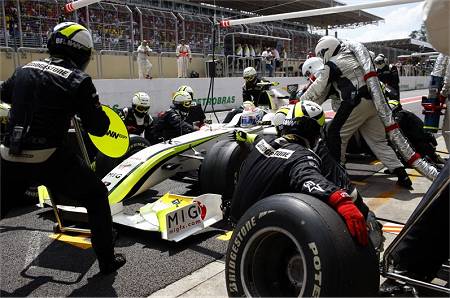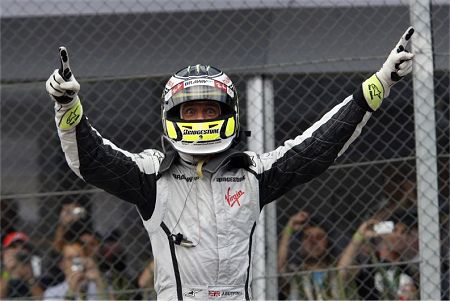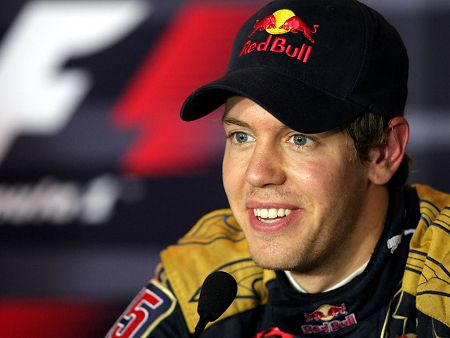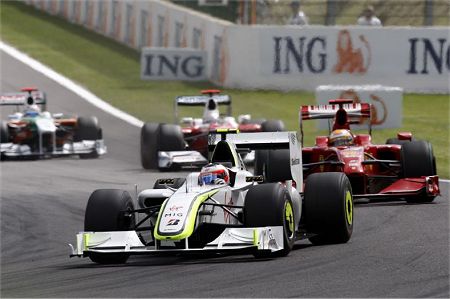<<
Page: 1 of 150
>>
A Lament for F1
22/10/2009
F1 Fanatic has an article today on domination of one driver in F1 and NASCAR. As it always does, this develops in the comments into a comparison between the two forms of motor sport and I am led to muse once again on the future awaiting the collection of apparent self-contradictions that calls itself Formula One.

Teamwork
I think it is entirely coincidental that "the pinnacle of motor sport" has developed in such a way as to mix intentions and aims that appear to conflict with each other. The fact that there are two championships involved, the drivers' and the constructors', seemed logical at first but, increasingly, brings tremendous pressure upon the nature of the sport as manufacturers and teams assign importance to one or the other. Many of the team managers would like to see the constructors' prize elevated to a position above the drivers' award; the manufacturers especially are in the game to demonstrate the superiority of their product rather than the excellence of any particular driver.
To date, the tension between these two goals has remained in balance, mainly because a team needs a top level driver who can make full use of its car. That may be changing, however, as illustrated by the debate over the worthiness or otherwise of this year's champion, Jenson Button. The fact that some argue that he would not have been champion had not the Brawn BGP001 been so superior to the opposition devalues the drivers' championship and suggests that whoever is in the best car will inevitably win the prize.
This has been the case in F1 ever since the constructors' trophy was introduced. Many would question the worthiness of such drivers as Mario Andretti, who won his championship in the Lotus 79, a car that was light years ahead of the competition, and who was teamed with a driver, Ronnie Peterson, reputedly only allowed to win if something happened to Mario. Much the same can be said of Michael Schumacher's championships and doubt has been cast upon the value of Jacques Villeneuve's and Damon Hill's championships in view of the superiority of their cars. By that reasoning, those drivers who won in less than the best car (Keke Rosberg springs to mind) would be the only true champions.
Although this dichotomy of goals in the sport leads to endless debate and argument over the real worth of each driver, it is also the factor that sets F1 apart from other forms of motor racing. Were we only interested in which driver is the best, a spec series in which all cars are equal would be the logical way to go. As it is, the unfairness of F1's system of diverse designs provides us with the opportunity to see astounding feats performed by outrageously gifted drivers; Ayrton Senna's drives in 1993 and Alonso's efforts over the last couple of years are examples.
So this aspect of F1 is immensely important to its appeal for us, the fans, and the FIA's ludicrous efforts to equalize everything from engine power to wing design are contrary to the spirit of the sport, threatening to reduce the value of the constructors' award to meaninglessness. As yet, the balance of objectives survives but it will be destroyed if the rule makers continue in their chosen direction.
So why has the FIA begun this process of standardization? The answer lies in another conflict of aims within the sport: entertainment versus sport itself. And here the lines become blurred, confusing us to the extent that we may argue from one point of view in some debates and from another in others.
It seems important to me to establish what we are trying to achieve with F1 and, to do that, we need to examine its roots. Without an understanding of the reasons for the sport's attraction for so many millions (both fans and dollars!), we will never understand what needs to be preserved and what can be allowed to wither.
And the most important factor we should realize is that entertainment was not the reason for the formation of the sport in the first place. Motor racing has been around for over a hundred years now and it was always inevitable that, sooner or later, the idea of a world championship should be suggested. To win a race is a fine achievement in itself but to win a series of races over the course of a year establishes real superiority.
From which we can see that F1 was invented for the drivers originally, not for the constructors or any fanbase that might accumulate. As in any other sport, the intent was to formalize an existing competition so that a competitor could demonstrate that he was the best. The matter of whether the result would be interesting enough for those outside the sport to watch was never taken into consideration.
It is potentially the undoing of F1 that it is watchable and has the capacity for becoming an obsession for some. As the number of fans has grown over the years, the possibility of making money from the sport has become too obvious to be ignored and, indeed, has become so important to those who benefit the most from exploiting the game that the nature of F1 has been obscured. Even FOTA, the organization of those who should understand the sport more than any other group, spends much of its time proposing ways to improve the show.
In effect, F1 has sold its soul to those who want only to milk it mercilessly. It has harbored ambitions of being a business and is now suffering the consequences as the money men seek to make it pay even more. And, just as in the fairy tale, the danger is that they will kill the goose that laid the golden egg.
No doubt you have been wondering (I have, anyway) where NASCAR comes into all this. It is relevant because it is further along the road to entertainment than F1, allowing us to see what the future might hold. Its increasing interference in the course of races to ensure close finishes and plenty of action is echoed in the direction F1 has taken over the last few years; we may not yet be at the stage where spurious safety car periods are introduced to close up the field but it is coming if F1 does not change course.
We need to face the fact that the number of viewers is not the measure of F1's success. Its success is in the value of its championship, the demonstration that this or that car and driver are the best in the world. That is what matters and whether the "show" is watchable or not has no relevance to the sport (or any sport, come to think of it) at all. If it is attractive enough to be televised, that is icing on the cake and we should not allow greed to distort the sport in an effort to get more.
The fact is that F1 is eminently watchable without artificial introductions to make it more of a draw to the public. I have followed it for over forty years, from a time long before it was televised, and there are many more like me amongst its fans. The glory of the sport itself was all we ever needed and anything that detracts from this serves only to turn us away.
We are a dying breed, of course, and you would be entitled to say that we do not matter in a world where TV viewing figures are all that count. But we are the true fans, the ones who have stuck with it through the years and the rule changes, and there are many like us amongst the new fans. If we depart, F1 will indeed become an entertainment, subject to the passing fancy of the masses and a vehicle only for the making of fortunes by a few. Then you will have NASCAR without the wheels being covered...
Clive
Make/read comments (75)
Thoughts on the Brazilian GP 2009
19/10/2009
There is very little to say about the Brazilian GP that has not been said already but I will try. It was a good race with plenty of action throughout the field and (dare I say it) the best driver on the day won. Mark Webber was in commanding form and did all that was necessary, staying with Barrichello in the first stint in spite of the Red Bull's heavier fuel load, then keeping up the pace to stay ahead of others coming through the field.

World Champion, Jenson Button
Rubens Barrichello tried hard but lacked that final bit of speed that would have kept him in contention. Once the fuel weights were known, it was obvious that the Brazilian would have to build a gap before the first pit stop but this he failed to do. And this is where he has been weaker than Jenson Button this year - when called upon for extra effort, he has been unable to provide it. One can say that he must be giving his all for the entire race therefore but champions seem to be able to find a little extra when it counts, just as Button did on several occasions.
I was glad that Button had a great race this time out, overtaking several cars on his way to the championship and reminding us that he has been one of the few to do so all year. He has had a lot of criticism recently and this was the best way to answer, his fifth place from 14th on the grid being the result of his driving rather than strategy. Just as fifth in Brazil was enough for Hamilton last year, so it was for Button in 2009, the only difference being that Jenson has a race to spare.
So congratulations and respect are due the new champion and all grumbling about whether Button "deserves" the title must be consigned to the sour grapes bin. Jenson may not have the flare of Alonso, the self publicist skills of Schumacher or the wild courage of Mansell but he is skilled in his own way.
Robert Kubica had a good race, too, taking an eventual second place that both he and the team worked hard for. And Lewis Hamilton was a worthy third place finisher, having started in 17th. Barrichello's hopes were already dead when Lewis came past him, inadvertently giving him the puncture that sealed his fate, but the pass was the moment at which Button's championship became certain.
Sebastian's Vettel's chances of staying in the title chase had gone with his poor qualifying position, of course, but he did a reasonable job of coming from the back to take fourth at the flag. Not many may have noticed but this was the race where the young German confirmed that he does know how to overtake another car; I think that is the first successful pass I have seen him achieve all year.
The stewards had a busy time in Brazil, eventually deciding that the Kovalainen/Fisichella clash was a racing incident (correct, although it could be mentioned that it was Vettel who tipped Heikki into his spin), the same for Sutil and Trulli (with Jarno being fined for his rather heated discussion with Adrian afterwards) and fines all round for the McLaren team for the premature pit lane release with fuel hose still attached (Heikki collecting a 25 second penalty in lieu of drive through). By recent standards, those are pretty sound decisions, perhaps assisted by the fact that only the protagonists cared about the outcome.
All in all, it was a satisfying GP with a series of results that are a fair reflection of the season. Brawn won the constructors' crown, Button the drivers', Webber had another race win to celebrate a season in which he proved equal to his wunderkind team mate and Vettel himself gained the consolation of fastest lap. It is perhaps fitting that all was decided in Brazil just as it has been in previous years and it leaves us free to enjoy the race at the new Abu Dhabi circuit without considerations of points scored or permutations of the championships. Interlagos is a great place to end a season (interesting that it will again be the last race next year).
Clive
Make/read comments (7)
Thoughts on the Japanese GP 2009
05/10/2009
I was so pleased that the GP was to be held at Suzuka again after a two-year absence that my expectations may have risen above the possible. Yes, it is a great circuit but it is just as capable of producing a featureless race as any other. And I have to admit that the GP disappointed me probably more than most this year.

Sebastian Vettel
It was not just that Vettel won without a serious challenge from anyone, the RBR5 being by far the best car this time. The whole weekend seemed dismal, rather like the weather on Friday. That was a bad start, the first two practice sessions being almost rained off and certainly no indication of form for the race. The series of accidents was, apparently, a sudden reminder to everyone that Suzuka is a dangerous place. Funny that - I had heard no mention of the fact when everyone was dreaming of its return to the calendar.
Then to have qualifying spoiled by accidents and the subsequent and variably-applied grid penalties was a bad sign for the race to follow. The only bright spot was that the three quickest men were in the first three places; surely a good race must result.
As we know now, that was certainly not the outcome. Vettel disappeared off into the distance and the only interest was the battle between Hamilton and Trulli, resolved at the final pit stop by a slight error from the McLaren driver. Fair enough, Toyota needed the second place to look good at home but it was hardly the stuff of a classic race.
In fact, it was a race largely decided by errors: Heidfeld losing his fourth place through a stuck wheel nut at a pit stop, Button salvaging a point thanks to Sutil and Kovalainen driving into each other just ahead of him, and Alguesuari stuffing it into the barriers again. Follow that with the stewards' illogical decision over Rosberg's speed under safety car conditions and we have a race that is best forgotten.
My only point is that we should regard each GP as a race in itself. Read the reports and the focus is on the championship, all commentators feverishly calculating the slim chances of a result that does not have a Brawn car and driver sweeping the board. But a great race is a great race, regardless of whether the championship is long decided, still in the balance or a nail-biting photo finish. Sure, we should tot up the points afterwards to see how things are going, but to make the various permutations of the numbers the main talking point is a sad commentary on the quality of the race itself.
Come to think of it, it is completely appropriate that this is exactly what happened in Suzuka. Roll on, Brazil...
Clive
Make/read comments (12)
Reflections on the Silly Season
01/10/2009
Now that Ferrari has confirmed Alonso as their driver alongside Massa for 2010, the silly season really gets going with rumors putting drivers "definitely" in one seat or another. In fact, only the Alonso move is certain and the rest is speculation, informed or otherwise. Much remains to be seen, as shown by Raikkonen's statement that he has yet to decide what he will be doing next year. I would guess that he will opt for some other form of motor sport, most likely rallying, and the second McLaren seat will stay open for more speculation.

Kubica's transfer to Renault seems a bit more solid, the team having said it will announce its drivers next week and Robert "95% sure" of his destination. That sounds like only the signing of contracts has yet to be arranged, unless both parties are thinking of something else entirely.
Nick Heidfeld, the other driver in the BMW/Sauber/Qadbak team that may or may not be on the grid has had his exit route closed by the rumor of the Barrichello/Rosberg swap between Brawn and Williams. Sir Frank's recent musing on the wisdom of pairing experience with youth adds weight to this suggestion. Quick Nick will probably stay with his old team, therefore, and that may be a better option than we realize.
Justifiably or not, he has been rated by most as slower than Kubica and he will not get a drive with any of the choice teams as a result. The new teams are unlikely to be ultra-competitive even if they make the grid in Bahrain, whereas the BMW team has shown itself capable of producing a race winner. With Robert gone and no other big name interested in his seat, Nick must be the team's best hope of success and he will have number one status in all but name.
Toro Rosso has said it will be sticking with its existing drivers (now there's a break from tradition!) but big question marks hang over Toyota. If the company gives the go-ahead for next year, Trulli is almost certainly out and Glock cannot be sure of retaining his seat. I would guess that the team will keep him on, if only for the sake of continuity, but it is difficult to see who would be right for the other drive. Toyota need a star, someone who will galvanize the team and ensure that the best is wrung from the car - but who is left, if Alonso is at Ferrari and Raikkonen back with McLaren?
Vettel would do but he has Red Bull written all over him and Webber will not move again before his retirement. Hamilton is owned by McLaren for the foreseeable future and Button surely has the sense to hang on to his Brawn drive. Who else is there?
It seems to me that this has always been Toyota's problem; they move too slowly in the driver market to ever secure the services of a driver with the standing and talent to motivate the team. That may be intentional, the company notoriously disliking individualism, but it handicaps them from the start. They will probably end up with another Renault outcast in the shape of Romain Grosjean.
The most interesting prospect is obviously the Massa/Alonso pairing; that will be hugely entertaining to watch. One might think the same of a Hamilton/Raikkonen match but I have my doubts. Whoever takes on Hamilton will need plenty of motivation and, as we have seen, this is Kimi's big weakness. Lewis has already had one Finn for breakfast anyway and will not be averse to another for lunch, I'm sure.
Like all seasons before they start, 2010 looks to be very interesting. Unfortunately, most seasons also disappoint and this could well be true of next year too. After all, I hear plenty of complaints about 2009 and yet it has been a year of constant upsets, amazing comebacks and unpredictability. Sometimes I wonder if most people only want to see their favorite team or driver winning...
Clive
Make/read comments (26)
<<
Page: 1 of 150
>>